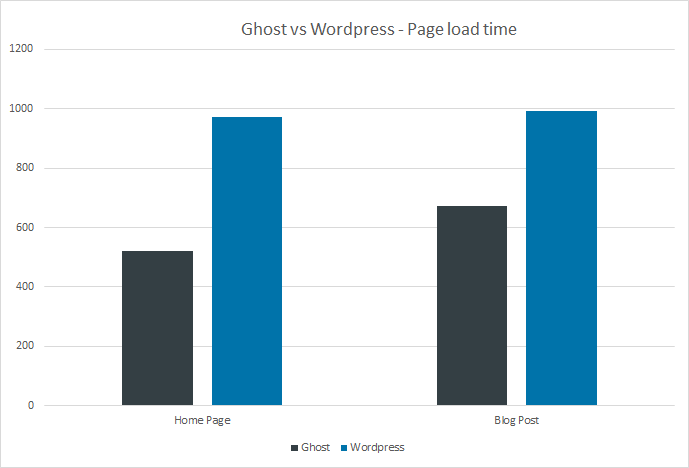Forums
Welcome to the Internet frontpage discussion billboard, the best place to discuss topics with other users ranging from marketing, technology, health, beauty, entertainment etc.
WordPress vs Ghost in 2025 — The Ultimate Comparison for Bloggers, Creators, and Businesses
WordPress and Ghost are two of the best publishing platforms in 2025 — but which is right for you? This in-depth guide compares their features, performance, SEO, and pricing to help you choose the perfect one. Discover which platform offers better speed, SEO, customization, and monetization for bloggers and businesses.
Introduction
Choosing the right platform to build your online presence in 2025 is more critical than ever. Whether you’re a blogger, a newsletter publisher, or a business that thrives on content marketing, the platform you select determines not just how your site looks — but how it performs, scales, and converts.
Two of the most talked-about platforms today are WordPress and Ghost. Both are open-source, both are designed for publishing, and both have passionate communities behind them. Yet, they serve different goals, philosophies, and technical needs.
This article will take you beyond surface-level comparisons. We’ll explore their strengths, weaknesses, costs, performance, SEO capabilities, design flexibility, and long-term potential — all updated for 2025. By the end, you’ll have a clear understanding of which platform best suits your vision.
Overview of WordPress and Ghost
WordPress was launched in 2003 as a blogging tool but quickly evolved into the most powerful content management system in the world. Today, it powers more than 43% of all websites, from personal blogs to large corporate portals. It runs on PHP and MySQL, and its greatest strength lies in its flexibility — you can build anything from a small portfolio to a massive eCommerce platform.
Ghost, on the other hand, launched in 2013 as a modern alternative built on Node.js. It was designed with simplicity and speed in mind, primarily for writers, journalists, and creators who focus on publishing and audience building. Over the years, Ghost has evolved into a clean, fast, and monetization-ready publishing tool with native support for memberships, newsletters, and subscriptions.
1. Ease of Use
If you’re looking for simplicity and a frictionless publishing experience, Ghost wins this round. Its interface is minimalist and distraction-free. You can log in, write your post in Markdown or rich text, hit publish, and you’re done. No unnecessary clutter, no plugin dependencies, and no complex setup steps.
WordPress, however, offers more power and control. Its Gutenberg block editor allows you to build visually complex layouts, but it also introduces a steeper learning curve. Beginners might find the interface busy, especially with multiple plugins, widgets, and menus competing for attention.
Verdict:
Ghost offers a cleaner, faster experience for writers. WordPress is better if you need deep customization and flexibility.
2. Speed and Performance
Speed is one of Ghost’s biggest advantages. Built on Node.js, Ghost delivers pages with minimal latency and far fewer server requests than a typical WordPress setup. It’s fast out of the box — even with dynamic content, caching, and newsletters running in the background.
WordPress can be fast, but only with the right setup. To match Ghost’s performance, you’ll need quality hosting, caching plugins, and a CDN. Managed WordPress hosts like Kinsta, WP Engine, or Cloudways make this easier, but performance can still vary depending on plugins and themes.
Verdict:
Ghost is faster by default. WordPress can match it with optimization and managed hosting, but it requires more effort.

3. Design and Customization
This is where WordPress shines. With thousands of free and premium themes, along with builders like Elementor, Divi, and Kadence, the possibilities are endless. You can create virtually any design without touching a line of code.
Ghost, in contrast, focuses on simplicity and minimalism. It has fewer themes and customization options. You can edit themes manually (via Handlebars templates), but you’ll need some coding knowledge. That said, Ghost’s built-in design philosophy keeps your site clean, fast, and distraction-free.
Verdict:
WordPress wins for flexibility. Ghost wins for simplicity and consistent aesthetics.
4. SEO and Discoverability
WordPress is known for its SEO power. With plugins like Yoast SEO, Rank Math, and All-in-One SEO, you can fine-tune every aspect of on-page optimization — from meta titles and sitemaps to schema markup and canonical URLs. It’s a favorite among SEO professionals for good reason.
Ghost has built-in SEO features such as structured data, canonical tags, and AMP support. It’s optimized right out of the box, but it lacks the extensive plugin-based customization that WordPress offers. For most content creators, Ghost’s SEO tools are sufficient — but large organizations or advanced SEO specialists might find them limited.
Verdict:
For plug-and-play SEO, Ghost is solid. For advanced SEO control and scalability, WordPress remains superior.
5. Plugins and Extensibility
No contest here — WordPress dominates with over 60,000 plugins that extend functionality in every direction imaginable. Whether you want to add eCommerce, analytics, social integration, or forums, you’ll find a plugin for it.
Ghost keeps things lean. Instead of plugins, it integrates directly with tools like Zapier, Stripe, and Mailgun. It favors simplicity and stability over complexity. While that’s great for performance, it means you’ll have to rely on third-party tools for many functions that WordPress handles internally.
Verdict:
WordPress wins for flexibility and integrations. Ghost wins for stability and performance.
6. Membership and Monetization
This is Ghost’s territory. It comes with native support for memberships, subscriptions, and newsletters — powered by Stripe. You can manage free or paid members, send emails, and even create tiered subscription plans without using extra plugins.
WordPress can do this too, but not natively. You’ll need to install plugins like MemberPress, Paid Memberships Pro, or Newsletter Glue to replicate what Ghost offers out of the box.
Verdict:
If your business model revolves around memberships or newsletters, Ghost gives you everything built-in. WordPress can do more, but you’ll need extra tools and setup time.

7. Security and Maintenance
Ghost is relatively low-maintenance. It’s less prone to vulnerabilities because of its lean core and smaller ecosystem. If you host on Ghost(Pro), all updates and patches are handled automatically.
WordPress security depends heavily on the user. Because it’s the most popular CMS, it’s also the most targeted by hackers. Keeping your WordPress site secure requires regular updates, strong passwords, backups, and sometimes security plugins like Wordfence or Sucuri.
Verdict:
Ghost is safer by default. WordPress can be secure, but only with good practices and active management.
8. Pricing and Cost
Ghost has two main pricing models:
-
Self-hosted: You can install it on your own server for free, but you’ll pay for hosting and email services.
-
Ghost(Pro): Managed hosting starts at around $9/month for individuals and goes up for publications and teams.
WordPress itself is free, but real costs come from hosting, premium themes, plugins, and developer maintenance. A professional WordPress setup typically ranges between $10 and $50 per month — and more if you scale or use paid extensions.
Verdict:
Ghost’s pricing is simpler and predictable. WordPress can be cheaper or more expensive depending on your configuration.
9. Community and Support
WordPress has the largest CMS community in the world — millions of developers, forums, tutorials, and agencies ready to help. You’ll never struggle to find resources.
Ghost’s community is smaller but passionate. Its documentation is excellent, and its official support (for Ghost(Pro) users) is responsive and professional.
Verdict:
WordPress has a bigger ecosystem. Ghost’s support is smaller but more focused and personal.
10. Scalability and Future Outlook
WordPress continues to evolve as a full web platform, not just a CMS. It’s expanding into headless CMS models, enterprise deployments, and integrations with modern frameworks like Next.js. However, its core structure (PHP-based) can feel dated for developers who prefer modern tech stacks.
Ghost is modern by design. Built on Node.js, it’s naturally faster and easier to integrate with modern tools and APIs. Its future roadmap focuses on publishing, memberships, and performance — not becoming a universal web builder, but being the best at what it does.
Verdict:
For scalability across use cases, WordPress wins. For modern simplicity and speed, Ghost leads.
Final Comparison Summary
Category Winner Notes Ease of Use Ghost Minimalist, distraction-free experience Performance Ghost Faster out of the box Design Flexibility WordPress Endless customization SEO Power WordPress Advanced plugin ecosystem Plugins/Integrations WordPress Massive library Memberships Ghost Built-in system Security Ghost Lean and low-risk Cost Ghost (managed) / WordPress (self-hosted) Depends on setup Community WordPress Larger and older Scalability WordPress Broader application scope
Conclusion — Which One Should You Choose?
If you want total control, flexibility, and limitless customization, choose WordPress. It’s the best option for businesses, agencies, and power users who need a scalable platform with every feature imaginable.
If you want speed, simplicity, and built-in monetization, go with Ghost. It’s ideal for writers, journalists, and newsletter creators who care more about publishing than plugins.
In 2025, the truth is that both platforms are exceptional — but your choice depends on what you value most.
-
WordPress is a Swiss Army knife — powerful but requires management.
-
Ghost is a precision tool — lightweight and laser-focused on publishing.
Either way, you’ll be joining two of the most passionate open-source communities on the internet — and setting yourself up for success in a world where content is still king.


